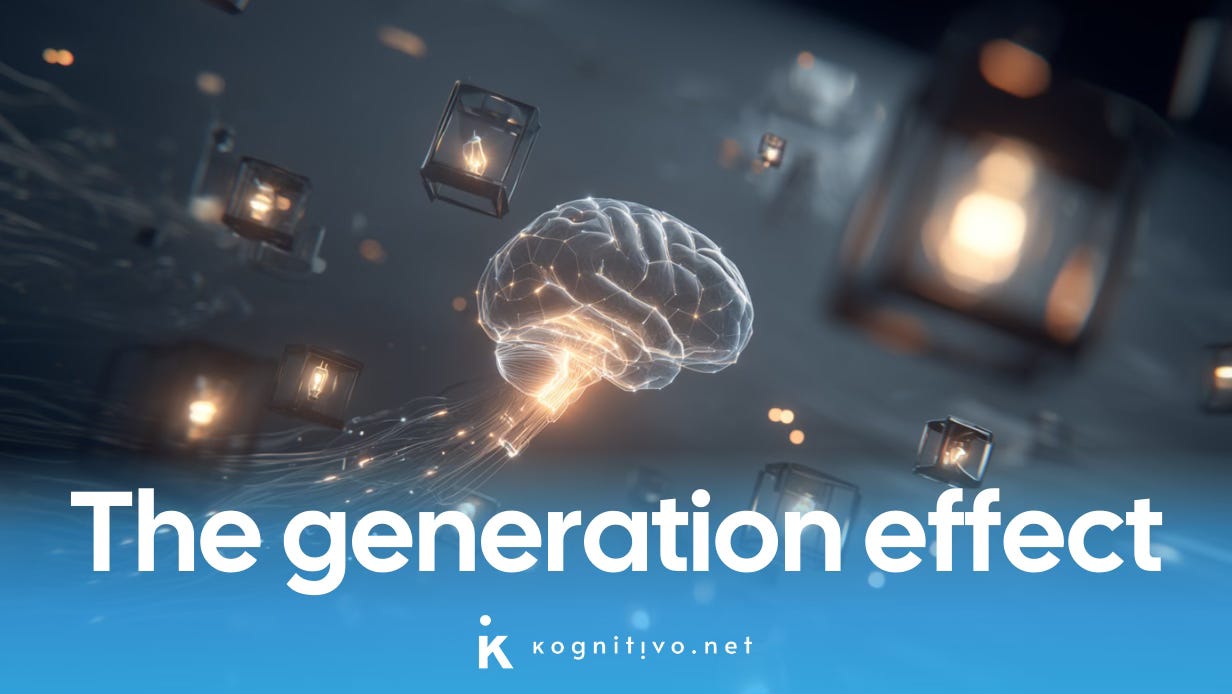Generation effect in learning: you are a generative engine
Guessing answers, even incorrectly, strengthens memory of the correct information, science shows. This is why the claim "embrace your mistakes" actually holds true: it's called the generation effect.
Picture this: you meet someone, exchange banter, then hit the “how old do you think I am?” trap. Social dread kicks in. You throw out a too-kind number. Of course, you’re wrong. They tell you their real age. You just lost a new friend. Or you never had them to begin with.
Weeks later, you realize that you don't know the exact age of many of your friends. However, you perfectly remember the age of the friend who "could have been." According to science, there’s a reason for this: it’s because you had to guess it first.
What is the generation effect?
The generation effect is the principle that you remember ideas better when you come up with them yourself rather than having them handed to you. Guessing, predicting, recalling, speaking or even running an inner monologue all do the trick.
People often think of “generative AI” when they hear “generate.” But the truth is: our brains invented this centuries ago. Want to learn faster? Start generating!
The generation effect in learning is one of the most reliable findings in cognitive science. This memory boost you get from producing information yourself (instead of passively receiving it) was first identified in the late 1970s and has been confirmed in dozens of contexts since. It explains why taking a stab at the answer, even if you’re wrong, often makes it stick.
Research shows that implementing the generation effect can increase learning retention by 20–40% compared to passive study.
Experts also call this a “desirable difficulty.” It’s related to retrieval practice but goes deeper. Generating boosts focus, forges stronger connections and layers new knowledge onto what’s already rattling around in your head. It has a strong creative element.
How the generation effect works
Here’s how it plays out. When you generate an answer, your brain cycles through many different steps and considers different ”factors”. These factors include focusing on the answer and relating it to other similar answers (for example discarding the answers that don’t fit). You also relate the information to the context in which you need it.
If you’re learning French and a friend hands you coffee, you grab for “merci,” but you pause and search your memory before you finally say it. You link it to similar words (s’il vous plaît, bonjour, gracias, Danke) and the situation, so next time you’re in that context, merci comes to mind more easily.
These factors (item-specific processing, relational processing and contextual processing) don’t just check what you know, they strengthened your knowledge through focused attention, rich connections and a match between learning and recall situations. This is explained by the three-factor theory.
When the generation effect works and when it doesn’t
The generation effect works best when:
The challenge is moderate: tasks are effortful, but achievable.
Timely feedback is provided: you receive confirmation or correction.
Questions invite explanation, prediction or inference, not just facts.
It’s weaker when:
You have zero prior knowledge (pure guesswork with no foundation).
There’s no feedback, especially for complex material.
The task is purely perceptual, with no conceptual connections.
Without feedback, there’s also a risk of false confidence: you risk thinking you’ve learned something because you generated it, but it may be wrong. Oddly enough, feedback that’s slightly delayed sometimes does the trick better. It gives your brain a moment to stew, then the real answer lands for good.
Without prior knowledge or context, information can stick if it's impressive or unexpected, but ultimately, it's not an efficient strategy. Especially for beginners, it’s important to balance generative strategies with providing information (direct instruction). This explains why you don't remember all the answers to every Trivial Pursuit question you've ever been asked, though you probably remember some.
Even wrong answers help
One of the most surprising findings about the generation effect is that you don’t need to be right for it to work. In fact, producing a wrong answer, as long as it’s corrected, can strengthen the memory of the correct information more than if you’d simply been told the right answer from the start.
When you guess, you activate related knowledge, focus attention and mentally commit to a possibility. When feedback arrives, your brain updates the “mental slot” you prepared for that answer, making the corrected version more distinct and easier to retrieve later.
In a nutshell, the idea is that you remember better a correction than information you can't relate to. A correction is always more relatable to you, because it's based on something you produced.
And this is a very concrete reason why you should totally overcome your fear of making mistakes. Consider that there is a more radical version of this technique that also works, according to science: the derring effect, making mistakes on purpose.
The “pause and guess” approach
The generation effect can be implemented in many different ways. The most traditional way is when you “explain it in your own words”, which means extracting the ideas and generating a your own explanation. But you can also use it before getting the information: pause strategically as you read and try to guess what comes next.
Foster your internal dialogue by setting up small challenges with yourself and "gamify learning in your own head": all you need to do is pause and try to guess what comes next. You're about to read an article? Turn the title into a question and try to answer it in your head before reading it.
You can apply this in any domain: guess words before checking, solve problems before seeing examples, predict the next recipe step or estimate a bill. While “pause and guess” may feel awkward, it usually takes less than a minute and helps you encode information much more deeply, saving a lot of time later.
Other ways to use the generation effect: active note-taking, Socratic dialogue, question generation, concept mapping or summarizing. Many advanced learners implement the generation effect naturally by internally questioning and discussing ideas as they read. This is possible because they are used to inner monologue and generate information to themselves.
Practicing the generation effect with AI
The best uses of AI for education create or support desirable difficulties and generation is a prime example! AI can be a great generation partner:
Ask it to quiz you without revealing answers. You can use role prompting for this to improve the accuracy of the replies: "Act as an expert in XYZ. Quiz me on the topic ABC".
Generate your own answer first, then request feedback. You can prompt it as simply as: “Consider this statement and provide feedback: XYZ”
Have it increase difficulty as you improve: "Make questions progressively harder."
Use "curveball prompts": Ask AI to give you a riddle, a “what happens if…” scenario or an odd but plausible analogy for a topic you’re studying, then try to resolve or complete it before the reveal.
The general idea is to move away from asking questions to the AI, to prompting the AI to ask you questions. Move away from “What is...? How can I...?” to prompting the AI with “Quiz me on what is...? Ask me how I can...?”.
The AI will give you feedback afterwards anyway, so don't be afraid to make mistakes (although, always double-check that it's not hallucinating!). This will help you remember the information much better than simply asking direct questions.
The best generative engine you have is your mind
That person’s age stuck with you because you guessed it first. The generation effect shows us that if you're actively involved in the production of information, you learn best. Who would have said that the best thing you can learn from an AI is to actually do what the AI itself does best? The generation of the information, rather than the information alone, is a technique that boosts your learning.
It also shows us in a concrete, science-backed way how mistakes are not the enemy of learning. Rather, it's the fear of making mistakes who's the true enemy. That fear leads to inaction and passivity, which truly hinder learning.
Next time you’re faced with a question, resist the urge to peek, take a guess. Use the world’s best generative engine: your own mind.
Nerd out with AI
Prompt suggestions. Always ask follow-up questions
Act as an expert in [subject]. Give me a series of questions where I must guess the answer first. Wait for my response, then provide detailed feedback, including why my answer was right or wrong. Make each question slightly harder than the last.
Describe a scenario, experiment, or problem in [topic]. Ask me to predict the outcome or next step before revealing it. After I answer, explain the correct result and the reasoning behind it.
Give me a tricky or unusual example related to [topic], like an analogy, ‘what if’ scenario or riddle. Have me generate a solution or explanation first, then provide feedback, highlighting connections to prior knowledge.
Links
📑 The generation effect: delineation of a phenomenon: Full text of the research paper that introduced the concept of the generation effect in the 1970s. Well worth reading even today.
📊 Theories of the generation effect and the impact of generation constraint: A meta-analytic review: This article summarizes the research up to 2020 of the generation effect. I recommend reading the short section on “Context memory theories” explaining how associative and contextual strengthening of memory works.





